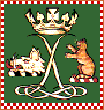Scottish History
The history of the Argyll and Sutherland Highlanders
The Regimental Museum in Stirling Castle
The Argyll and Sutherland Highlanders, 1939 - 1945
In the Second World War the Regiment consisted of the two Regular Battalions, seven Territorial Battalions and the 15th Battalion.The 1st Battalion saw service in Palestine, North Africa, Crete, Ethiopia, Sicily and Italy.

The Singapore Causeway
The 2nd Battalion, who were in Malaya when war broke out, fought the Japanese down the length of Malaya, held the Causeway into Singapore and  after the final battles of Singapore became Prisoners of War of the Japanese. In 1942 the 15th Battalion, who were serving in Orkney, were told that they were to be reconstituted as the new 2nd Battalion. They subsequently took part in the Normandy battles and ended up on the Elbe just before V.E. Day.
after the final battles of Singapore became Prisoners of War of the Japanese. In 1942 the 15th Battalion, who were serving in Orkney, were told that they were to be reconstituted as the new 2nd Battalion. They subsequently took part in the Normandy battles and ended up on the Elbe just before V.E. Day.

The 5th Battalion fought in France and Belgium with the British Expeditionary Force before becoming the 91st Anti-Tank Regiment and were subsequently involved in the Normandy Landings and the fighting up to the Elbe.
The 6th Battalion fought in France and Belgium with the British Expeditionary Force before becoming the 93rd Anti-Tank Regiment, they then served in Tunisia, Sicily and Italy.

8th Battalion at Longstop Hill, from a diorama in the Museum
The 7th and 8th Battalions formed part of the 51st Highland Division in France in 1940 and both battalions suffered grievous casualties before escaping through Le Havre. They were re-formed based on the 10th and 11th Battalions who were still in Scotland. The 7th Battalion remained in the 51st Highland Division for the rest of the war in North Africa and Sicily before returning to take part in the Normandy Landings and through to the Baltic. The 8th Battalion fought in Tunisia, Sicily and all the way up Italy.
The 9th Battalion who had been converted to a Light Anti-Aircraft Regiment also served with the British Expeditionary Force in France, before forming part of the U.K. defences. They ended the war in Holland.

